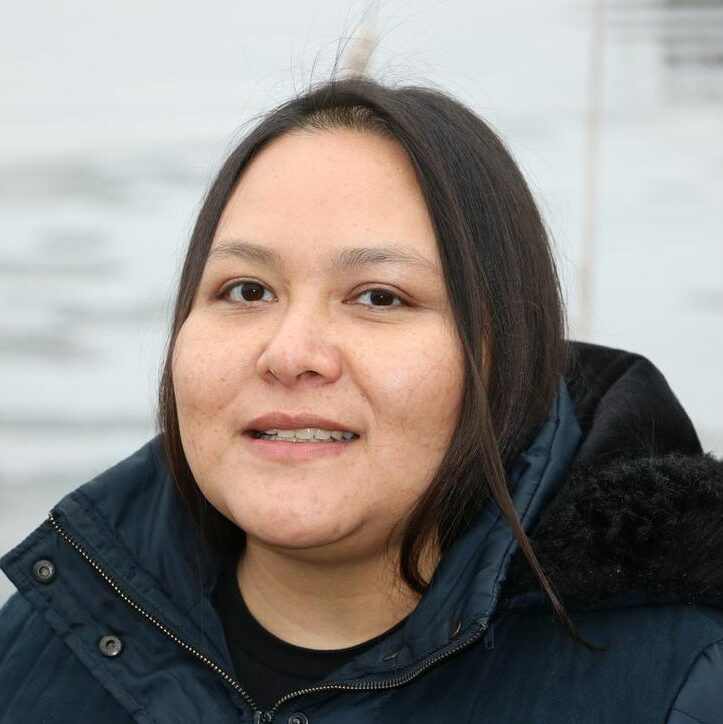Dispatch by Dr. Angele Alook and Hunter Bidder

This blog post is based on a forthcoming book chapter by the authors.
This summer, I attended a knowledge keeper gathering at my First Nation. I wanted to facilitate a workshop which I called Empowering Iskwewak (women) in which I would share my academic knowledge of how colonialism destroyed our traditional gender roles and how we can be empowered by learning this history and recognizing the amazing labour women carry out in our community today, whether it is wage labour, caring work, or work on the land.
I had a plan to decolonize my community by smashing the colonial heteropatriarchy, which was so silly of me. I did not need to decolonize anyone or teach the colonial history. The women in my workshop lived through the abuse of residential schools; they knew what it was like to be an Indigenous woman on reserve and in the city; they were already empowering women by telling their stories.
Instead, I learned from the young women and aunties that attended my session. My elders decolonized me.
We talked about women’s roles in our community. I got a glimpse of some of our traditional roles as water protectors. While listening to these stories, I understood these strong women in my life even better. From an early age, their elders gave them the most significant role of gathering water for the family. This role was life and death: they could die gathering the water, and their families would not have life without this water. I understood the sacredness of these women in my life, and how they carried this power as those who carried the water for their elders. I saw how this gave them a role and belonging in their family.
Indigenous feminism is not positioned against something but for something—for water, for the future, for each other, and for life itself.
Western ideologies and settler colonial systems have negatively impacted gender relations and the environment in many ways. In Indigenous societies on Turtle Island, Indigenous women and non-binary individuals were once considered equal and had sacred leadership roles and essential knowledges in many domains of daily life (Dennis et al., 2020). Indigenous ontologies and epistemologies were violently suppressed and marginalized through settler colonialism and within contemporary practices of water governance (Wilson et al., 2018). The consideration of gender here is essential. Not only for examining extraction sites, in which the violence to the land can be equated to increased violence against Indigenous women and children (Christiansen, 2021), but also the consideration that global environmental change is inherently gendered, affecting women first and worst (Dennis et al, 2020, citing: United Nations, 2019).
Indigenous feminism has long argued that settler colonial power targets Indigenous bodies as objects for gender violence. Regions that experience oil booms face rises in violence against Indigenous women, children, and 2SLGBTQQIA+ individuals (two-spirit, lesbian, gay, bisexual, transgender, queer, questioning, intersex, asexual, plus) (Christiansen, 2021). Indigenous feminism is not positioned against something but for something—for water, for the future, for each other, and for life itself (Hughes, 2020).
The parallels between the life-giving abilities of both women and water have been well documented across the literature, especially as sacred and deeply spiritual. It is because of these commonalities that women assume primary responsibility for overseeing the well-being of community water supplies. In other words, water quality issues can threaten spiritual and cultural well-being at the same time that they endanger physical health, local and household economies, and the environment (Anderson et al., 2013; Anderson, 2010).
Under colonialism Indigenous women have often been excluded from discussions and decisions about water management, with the result that their knowledge has not necessarily been brought to bear on the development of protocols and practices. This is a form of displacement and a silencing of Indigenous women’s knowledges. Including these women’s views is critical if we hope to understand the spiritual, social, and cultural meanings as well as the economic and political importance of water quality and security. Women have a responsibility to share what ought to be done (Whyte, 2014; McGregor, 2004 & 2014). However, racist systems that produce poor health, poor education, and limited access to higher-paying jobs serve to keep women consistently on the margins (Green, 2007).
Colonial understandings of water remain problematic, limited to either a commodity to be bought and sold or a fundamental human right. Whereas, across many Canadian First Nation communities, water is considered the blood of mother earth, which is fundamental to sustain life, requires mutual respect, and care equal to humans, plants, and animals. According to some scholars, in approximately 40 years of Canadian environmentalism, there has not been a major environmental victory won without First Nations at the helm, asserting their Aboriginal rights and title. Much of this reconciliation is led by women (Standing Rock Syllabus). For example, the REJECT TECK campaign that led to the end of major development in the Tar Sands, which was championed by Indigenous Climate Action, a women-led organization. Other communities fighting for future generations include the Wet’suwet’en stopping the Coastal GasLink pipeline; Coast Salish and Secwepemc opposing the TMX pipeline; Sipeken’katik - Mi’kmaq who are holding strong against Alton Gas; Grassy Narrows continuing to fight forestry and hydro, and countless other Indigenous communities threatened by extractive projects that undermine their rights and survival.
Indigenous feminism is premised on values of sharing, reciprocity, equality, and responsibility. A resurgence of Indigenous modes of intelligence is necessary to protect water.


Water must be protected to sustain land-based knowledges and practices. Substantial amounts of fresh water are used to produce oil and the resulting large tailings ponds that hold contaminated water pose major environmental risks, and Indigenous peoples have witnessed major bodies of water have been polluted by the oil industry. Settler colonial structures broke, and continue to break, traditional governing practices and spiritual beliefs in First Nation structures by undermining the roles of women (Baskin, 2020). There must be a resurgence of traditional knowledge (TK) in resource governance, in which an Indigenous Feminist approach has value for addressing both systemic harms and systemic transformations (Green, 2007).
The framework of Indigenous feminism is a vision of relationality and collective political organization that is deeply intersectional and premised on values of sharing, reciprocity, equality, and responsibility. It is a way of being and acting that aligns with specific values, values that depend upon and demand kinship, obligation, reciprocity, and action. Many scholars, Indigenous Peoples, and allies, alike argue that a resurgence of Indigenous modes of intelligence and concepts of nationhood are necessary to protect water. Deborah McGregor (2014) argues traditional knowledge (TK) can play a significant role in water governance. However, an important part of the process of implementing TK involves decolonization. Simply taking or “extracting” TK from the community and inserting what is deemed relevant into environmental management regimes (the “knowledge extraction paradigm”) is an approach that is failing all parties.
According to radical Dene scholar Coulthard (2014), a liberal politics of recognition geared toward the state and the goal of recognition alone fails because it does not address the concomitant structural problems of settler states, including the capitalist economy, racial and gender hierarchies, and dominance of Indigenous peoples, lands, and resources. For Indigenous nations to live, capitalism must die. And for capitalism to die, we must actively participate in the construction of Indigenous alternatives to it.
Contemporary movements and activism for Indigenous self-determination require the consideration and inclusion of gender. The examples of Idle No More and REJECT TECK, two women led movements, highlight how the resurgence of Indigenous modes of intelligence and concepts of nationhood are necessary to protect water and in water management. This traditional knowledge is housed in women, we need to listen to their stories, instilled in them by Mosom and Kohkom; thereby, empowering women and decolonizing listeners. Overall, contemporary movements and activism for Indigenous self-determination require the consideration and inclusion of gender.
References
Anderson, K., Clow, B. & Haworth-Brockman, M. (2013). Carriers of water: Aboriginal women's experiences, relationships, and reflections. Journal of Cleaner Production, 60(1), 11-17. doi: 10.1016/j.jclepro.2011.10.023
Anderson, K. (2010). Culturally Considerate School Counseling: Helping Without Bias. Corwin: Thousand Oaks, CA.
Baskin, C. (2020). Contemporary Indigenous women's roles: Traditional teachings or internalized colonialism? Violence Against Women, 26(15-16),
Christiansen, J. (2021). The water protectors at Standing Rock: Survivance strategies for gendered relinking. Women's Studies in Communication, 44(3), 278-300. doi: 10.1080/07491409.2020.1834037
Coulthard, G. (2014). Red Skins, White Masks: Rejecting the Colonial Politics of Recognition. University of Minnesota Press: Minneapolis, MN.
Dennis, M.K. & McLafferty Bell, F. (2020). Indigenous women, water protectors, and reciprocal responsibilities. Journal of Social Work, 65(4), 378-386. doi: 10.1093/sw/swaa033
Green, J. (Ed.) (2007). Making Space for Indigenous Feminism. Fernwood Publishing: Winnipeg, MB.
Hughes, B. (2020). Oka Apevchi: Indigenous feminism, performance, and protest. Theatre Journal, 72(2), 127-142. doi: 10.1353/tj.2020.0029
MacGregor, D. (2004). Coming full circle: Indigenous knowledge, environment, and our future. American Indian Quarterly, 28(3/4), 385-410. doi: https://www.jstor.org/stable/4138924
MacGregor, D. (2014). Traditional knowledge and water governance: The ethic of responsibility. AlterNative: An International Journal of Indigenous Peoples, 10(5), 493-507. doi: 10.1177/117718011401000505
Whyte, KP. (2014). Indigenous women, climate change impacts and collective action. Hypatia: A Journal of Feminist Philosophy, 29(3), 599-616. doi: 10.1111/hypa.12089
Wilson, N. J. & Inkster, J. (2018). Respecting water: Indigenous water governance, ontologies, and the politics of kinship on the ground. Environment and Planning E: Nature and Space, 1(4), 1-23. doi: 10.1177/251484861878937
